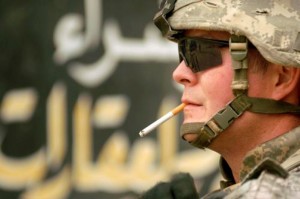
Fort Carson’s top NCO clearly outlines dos and don’ts for soldiers
Command Sgt. Maj. David Clark has a few rules for his Fort Carson soldiers – 42 pages worth.
As the 4th Infantry Division’s top enlisted soldier, Clark spearheaded the new rulebook released this month that outlaws walking while smoking and requires soldiers to exit their cars to render honors to the nation at the end of the duty day.
The new rules lighten requirements for reflective belts but reinforce tough new regulations on tattoos and piercings.
“I tried to lay it out so everyone clearly understands the standards,” said Clark, who hit his 30th year in the Army this month.
One of the changes that will have the widest impact concerns smoking. After more than a decade of lax wartime enforcement of regulations on cigarette use, the Army is pushing troops to kick the habit.
That means smokers must put away their packs during training exercises and obey rules that forbid them from walking and smoking on base.
“We want to show them what right looks like,” Clark said.
There are moves afoot at the Pentagon that could ban cigarette sales on bases or make bases smoke-free.
Smoking, for now, remains OK in designated areas. In the field, though, soldiers may want to bring some nicotine gum. Smoking will be allowed in the field only in designated areas and on designated breaks from training.
“It’s training and it’s for training,” Clark said.
Clark said part of training for warfare includes learning how to do without creature comforts. And at night, a lit cigarette can draw a sniper’s bullet.
“We look at the discipline of our force and we look at noise and light discipline,” Clark said.
The standards manual has been in the works for three months, and commanders will have 60 days to bring their soldiers up to speed.
Some of the standards are in full-force now, especially when it comes to military courtesy.
A Fort Carson private started a social media storm this year when she snapped a selfie while hiding in her car from a retreat formation. The formation, which happens at the end of every duty day on Fort Carson, requires soldiers to pause and salute while honors are rendered to the flag.
Fort Carson regulations now require all soldiers to get out of their cars and render honors.
“It’s really about getting back to our customs and courtesies,” Clark said.
With 13 years of war set to end Dec. 31 when the last combat troops leave Afghanistan, the Army is working to stiffen policies that were allowed to slide while soldiers fought overseas.
“It never went away, but we’re getting back to the basics,” Clark said,
One change that some soldiers will cheer: The hated reflective belts long worn as a mandatory accessory with physical training uniforms will see less use. Clark said he’s allowing low-level commanders to decide whether soldiers need the reflective belts.
“We’re creating soldiers and leaders to think,” he said. “We want to empower it down to leaders based on the situation.”
As the senior enlisted soldier on Fort Carson, Clark serves as the post’s head disciplinarian. Bad haircuts, messy uniforms and misconduct downtown all wind up in his office.
He said that all those regulations and policies he enforces are what separates America’s Army from its rivals. A disciplined force with stringent standards is one that wins in battle, too, he said.
Soldiers are going to get acquainted with those standards quickly. The rulebook released this month comes as an online document, a pocket-sized book or as a smartphone application.
Sergeants and officers are expected to teach their soldiers the rules and to ensure they are followed.
“We owe our soldiers the best leadership that we can provide,” Clark said.
Clark expects all but a handful of soldiers to easily comply with the rules.
“There will be people who will test it, and there is corrective training for that group and I think it’s a small group,” he said.
For those picturing the maniacal torture a sergeant major could inflict on a scofflaw, Clark says he want soldiers to learn, not suffer.
“It constructive not destructive,” he said.
SOURCE: Gazette




